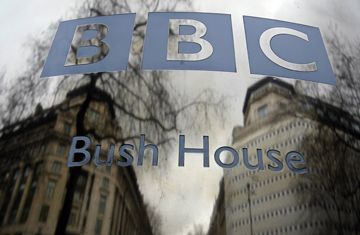
Reflections are seen in a sign outside the BBC's Bush House in London
There's a small shortwave radio sitting on the kitchen shelf in my home in Belgrade, just gathering dust. The broken antenna has been replaced by a piece of wire, the titanium casing is dented and scratched, but all it needs to spring to life is a fresh set of batteries. Not so long ago, this gadget was a very important part of my life. And it was permanently tuned to BBC World Service.
During the 1991-1999 bloody breakup of Yugoslavia, in the days before the Internet and cell phones, the shortwave radio was a reporter's best friend, and sometimes virtually a lifesaver. In the absence of electricity, operational phones, and reliable local news sources, the voices of BBC news presenters were often the only friendly ones around. In the fog of Bosnian war, the BBC's constant stream of balanced and detailed reports was everyone's compass. No other media outlet had so many people on the ground, and no other could provide the big picture, updated every hour and so easily accessible. And during the despotic rule of Slobodan Milosevic, BBC Serbian Service was one of few media outlets where opposition voices could be heard.
Soon my shortwave radio will become just a useless little relic. A few days ago, the BBC announced the cancellation of several foreign language services, including Serbian, Macedonian, Albanian, Russian, and Mandarin. And in a couple of years, all shortwave transmissions will be shut down, as a part of the austerity measures introduced in the U.K. The BBC management says that the state-funded corporation is adapting to "changes in the global media landscape" that have taken place in the last decade.
I'm not the only one who finds this decision regrettable. "Could the Allies have won World War II without Radio London?" asks Milos Vasic, a veteran Serbian reporter, recalling that listening to the BBC's predecessor was a capital offense in Nazi-occupied Europe, and that during the Cold War, the Soviet Union spent considerable resources to jam the BBC's broadcasts. "The first things that disappear in times of trouble are cellphone networks and the Internet — look at Egypt," says Vasic. "The shortwave was, and still is, indispensable."
In the BBC Serbian Service Bureau, which will close in a few weeks, the mood is unsurprisingly gloomy. "We expected cuts, but not a complete amputation," says Slobodan Stupar, who is about to lose his job after 18 years with the corporation, along with more than 600 others worldwide who are affected by the budget squeeze. It's not that BBC is leaving Serbia in the dark. More than ten years after Milosevic's downfall, Serbia is a democracy, and the press is free, at least in theory. In practice, the combined pressure of the government and the oligarchs discourages journalists from probing into unpleasant topics, such as high-level corruption or organized crime. In its recent report, the U.S.-based watchdog Freedom House ranked Serbian media as "partly free," citing undue political and business influence and harsh libel laws.
Still, partial freedom is better than none, so maybe there's room for a more optimistic view. When the BBC dissolved its Slovenian and Croatian language service some years ago, it was widely seen as a sign that these countries are becoming stable democracies that no longer need information transfusions from the outside. Maybe this also applies to Serbia, and other countries affected by the recent cuts, like Macedonia and Albania? "Not likely," grumbles Vasic. "We are about to lose the gold standard of objectivity and accuracy in radio reporting. This will not end well."
